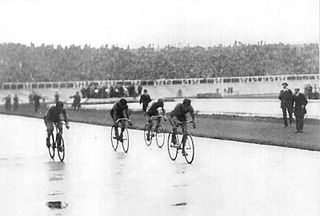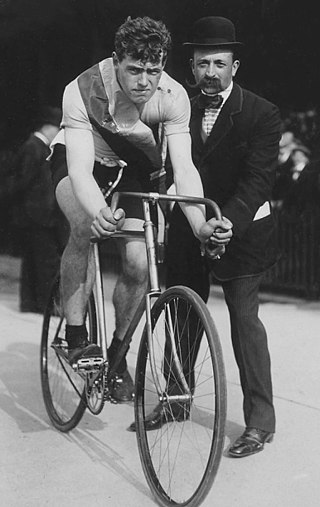
The 1900 Summer Olympics were held as part of the 1900 World's Fair, during which many cycling events were contested. The IOC website currently affirms a total of 3 medal events, after accepting, as it appears, the recommendation of Olympic historian Bill Mallon regarding events that should be considered "Olympic". These additional events include the men's points race. Thus, three cycling events are considered Olympic events. These three competitions were held between 9 September and 16 September 1900. The cycling part of the World's Fair included 250 competitors, 160 of them French. In the sprint and 25 km events, 72 competitors, all men, from seven nations competed.

The men's points race in cycling at the 2004 Summer Olympics consisted of a 160 lap points race with 16 sprints where points were awarded. The event was held on 24 August 2004 at the Athens Olympic Velodrome. There were 23 competitors from 23 nations, with each nation limited to one cyclist in the event. The event was won by Mikhail Ignatiev of Russia, the nation's first victory in the men's points race. Spain's Joan Llaneras, the defending champion, took silver; he was the first and only person to win multiple medals in the relatively short-lived points race, and ended with three medals after another gold in 2008. Guido Fulst of Germany took bronze, the first medal in the event for that nation since 1900.

The 1905 Tour de France was the third edition of the Tour de France, held from 9 to 30 July, organised by the newspaper L'Auto. Following the disqualifications after the 1904 Tour de France, there were changes in the rules, the most important one being the general classification not made by time but by points. The race saw the introduction of mountains in the Tour de France, and René Pottier excelled in the first mountain, although he could not finish the race. Due in part to some of the rule changes, the 1905 Tour de France had less cheating and sabotage than in previous years, though they were not eliminated. It was won by Louis Trousselier, who also won four of the eleven stages.

The 1907 Tour de France was the fifth running of the annual Tour de France, one of cycling's Grand Tours. From 8 July to 4 August, the 93 cyclists cycled 4488 km (2,788 mi) in fourteen stages around France. The winner, Lucien Petit-Breton, completed the race at an average speed of 28.47 km/h (17.69 mi/h). For the first time, climbs in the Western Alps were included in the Tour de France. The race was dominated at the start by Émile Georget, who won five of the first eight stages. In the ninth stage, he borrowed a bicycle from a befriended rider after his own broke. This was against the rules; initially he received only a small penalty and his main competitors left the race out of protest. Georget's penalty was then increased and Lucien Petit-Breton became the new leader. Petit-Breton won two of the remaining stages and the overall victory of the Tour.

Louis Trousselier was a French racing cyclist who won the 1905 Tour de France. His other major wins were Paris–Roubaix, also in 1905, and the 1908 Bordeaux–Paris. He came third in the 1906 Tour de France and won 13 stages of the Tour de France over his career. He also competed in the men's 25 kilometres event at the 1900 Summer Olympics and won a bronze medal in the Men's points race.

The men's 10 kilometres was one of the five track cycling races on the Cycling at the 1896 Summer Olympics programme. It was held on 11 April and comprised 30 laps of the track. The 1896 Games was the only time that the 10 kilometres track race was part of the cycling program at an Olympic Games. Six cyclists from four nations competed. The event was won by Paul Masson of France, the second of his three victories that day. His countryman Léon Flameng finished second, while Austrian Adolf Schmal was third.

The men's sprint was one of the three cycling events, all track cycling, now regarded as "Olympic" on the Cycling at the 1900 Summer Olympics programme. It was held on 11 September and 13 September. The sprint, a 2000-metre race with 1000-metre heats, was conducted in four rounds. 69 of the 72 cyclists competed in the sprint, including cyclists from all six competing nations. The event was won by Albert Taillandier of France, with his countryman Fernand Sanz in second place. John Henry Lake of the United States won the nation's first cycling medal with his bronze.

The men's 25 kilometres was one of three cycling events, all track cycling, on the Cycling at the 1900 Summer Olympics programme that were open to all amateurs, had more than one nation participating and no handicapping. It was held on 15 September. Ten cyclists competed. Four had already competed in the sprint event. The result of the race proved Louis Bastien of France to be the top long-distance cyclist present, while Lloyd Hildebrand finished in second and Auguste Daumain in third. One of the contestants, Louis Trousselier, would go on to win the 1905 Tour de France. Prizes were awarded to the top four finishers: art objects valued at 400 francs, 300 francs, 200 francs (third), and 100 francs (fourth).

The men's 100 kilometres was one of seven track cycling events on the Cycling at the 1908 Summer Olympics programme. Its distance was the longest of the individual event distances. A challenge cup was presented by the Prince of Wales to the winner. There were 43 competitors from 11 nations. Each nation could enter up to 12 cyclists. The event was won by Charles Henry Bartlett of Great Britain, with his countryman Charles Denny finishing second. Octave Lapize earned bronze, making France the only nation to have medalists at both appearances of the 100 kilometres race.

The men's 1000 metre sprint was one of seven track cycling events on the Cycling at the 1908 Summer Olympics programme. Its distance was the second shortest of the individual event distances. Each nation could enter up to 12 cyclists.

Norway competed at the 1912 Summer Olympics in Stockholm, Sweden. 190 competitors, 188 men and 2 women, took part in 58 events in 14 sports.

The men's points race was an event at the 1988 Summer Olympics in Seoul, South Korea, for which the final was held on 24 September 1988. There were 34 participants from 34 nations, with 24 cyclists competing in the final. Each nation was limited to 1 cyclist in the event. The event was won by Dan Frost of Denmark, with Leo Peelen of the Netherlands taking silver and Marat Ganeyev of the Soviet Union bronze. It was the first medal in the men's points race for each of the three nations.

The men's points race was an event at the 1992 Summer Olympics in Barcelona, Spain. There were 38 competitors from 38 nations, with 24 cyclists competing in the final. Each nation was limited to one cyclist in the event. The event was won by Giovanni Lombardi of Italy, the nation's first victory in the event since 1900 and second victory overall; Italy was the first nation to have two wins in the men's points race. Léon van Bon gave the Netherlands its second consecutive silver in the event. Bronze went to Cédric Mathy of Belgium.

The men's points race was an event at the 1996 Summer Olympics in Atlanta, Georgia. There were 28 participants from 28 nations, with 24 cyclists completing the final, which was held on July 28, 1996. Each nation was limited to one cyclist in the event. The event was won by Silvio Martinello of Italy, the nation's second consecutive and third overall victory in the men's points race. Silver went to Brian Walton of Canada and bronze to Stuart O'Grady of Australia; it was the first medal in the event for both nations.

The men's points race was an event at the 2000 Summer Olympics in Sydney, Australia. There were 23 participants from 23 nations competing in the final, which was held on 20 September 2000. Each nation was limited to one cyclist in the event. The event was won by Joan Llaneras of Spain, the nation's first medal in the men's points race. Silver went to Milton Wynants of Uruguay and bronze to Aleksei Markov of Russia; those nations also earned their first medals in the event.

The men's points race at the 2008 Summer Olympics took place on August 16 at the Laoshan Velodrome. There were 23 competitors from 23 nations. The event was won by Joan Llaneras of Spain, his second victory in the points race and third consecutive medal in the event. Llaneras was the only person, of any gender, to win multiple medals in the points race, which is no longer on the Olympic programme. His two gold medals made Spain only the second nation to win multiple golds in the men's event; Italy had three. Silver went to Roger Kluge of Germany. Great Britain earned its first medal in the men's points race with Chris Newton's bronze.

The triathlon events at the 2012 Summer Olympics were held in Hyde Park in London, United Kingdom, with the women's triathlon held on 4 August and the men's on 7 August. 110 triathletes from 39 countries competed with 55 men and 55 women competing. The races were held over the "international distance" and consisted of 1.5 kilometres (0.93 mi) swimming, 43 kilometres (27 mi) road cycling, and 10 kilometres (6.2 mi) road running.

The men's triathlon was one of the triathlon events at the 2012 Summer Olympics in London, United Kingdom. It took place on 7 August 2012, featuring 55 men from 32 countries. It was the fourth appearance of an Olympic men's triathlon event since the first at the 2000 Olympics in Sydney. The race was around Hyde Park, a 1.42 km2 park in central London. The race was held over the "international distance" and consisted of 1.5 kilometres (0.93 mi) swimming, 42.959 kilometres (26.693 mi) road cycling, and 10 kilometres (6.2 mi) road running.
Enrico Brusoni was an Italian cyclist.

Tour d'Azerbaïdjan was a 2.1 multi-stage bicycle race of the UCI Europe Tour, which took place in Azerbaijan around May between 2012 and 2017. Each day, participants started on a new phase of the race. The race was held in 7 regions of Azerbaijan and finished in the capital, Baku. Other large cities the race moved through were Oguz, Chamakh, Maraza, Ismayilli, Gabala, Sheki.


















